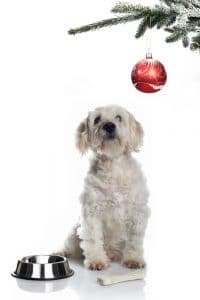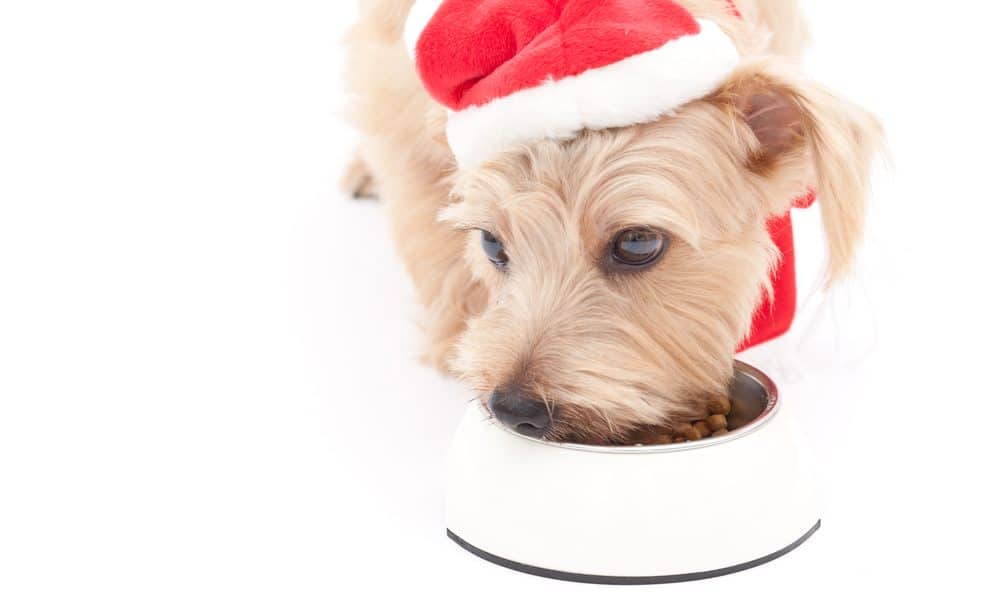Did you know that christmas pudding could kill your dog? It’s a well known fact that dogs love food – and we love feeding them. But before you give in to those puppy dog eyes this Christmas, make sure you know what your pup can and can’t eat. Dogs will pretty much scoff anything that we put in front of them so it’s up to us to make sure what we give them is safe to eat.
We all know that chocolate is a big no-no but what else could potentially harm your pup? Of course there’s no reason as to why youshouldn’t treat your dog to a little something special for their Christmas dinner, but speak to any vet and and they will tell you that Christmas is a potentially risky time for pets. Here’s a list of some of the most common Christmas foods you don’t want to feed your dog – not matter how big the puppy dog eyes!
 Alcohol
Alcohol
This might seem like an obvious one but alcohol is so much more toxic for dogs than humans. Ingestion of food or drink containing even the smallest amounts of alcohol can cause vomiting, diarrhoea and can even lead to serious liver damage.
Christmas pudding & mince pies
Many people don’t know that dogs should avoid eating raisins, currants and grapes. If eaten, it can lead to vomiting, lethargy and diarrhoea. As signs progress, your dog might become increasingly dehydrated, can refuse to eat and may show an increase in urination followed by decreased or absent urination in later stages. This can also lead to kidney failure. Not only that,many cakes contain alcohol (particularly soaked fruit cakes) so there’s even more of a risk. A hungry dog can devour a cake within minutes, and if there is a significant amount of spirit in the mix, that’s quite a quantity of alcohol. Keep fruit cakes well out of the reach of the family pet.
Chocolate and sweets
You should never give your dog chocolate – Christmas or no Christmas! A chemical in chocolate known as theobromine can cause serious harm to your pet even in small quantities, and can affect hormonal and neurological functions in dogs, with side effects including hyperactivity, vomiting, lethargy, seizures, coma and potentially death. The darker and higher the percentage of cocoa, the more theobromine is in the chocolate. With high sugar and fat content, sweet delicacies in general are a severe no-go so steer clear of anything like that.
Cooked bones
You may think bones are a common treat for dogs, but cooked bones are brittle. Turkey, lamb, chicken, beef and pork bones that are cooked can easily splinter and get lodged in their digestive system. It can also cause severe constipation. If you want to give your dog a bone, then stick to uncooked, raw bones as they are less
likely to splinter and are also actually beneficial for their teeth and hair. Introduce raw bones gradually and keep the leftover cooked bones firmly on your plate!
Onions and garlic
These foods contain thiosulphate, which is poisonous to dogs whether eaten raw or cooked. Signs of poisoning are usually seen 2-4 days after ingestion and include lethargy, breathlessness, vomiting and diarrhoea. Whilst foods like stuffing and gravy might seem innocent enough, it’s probably best to steer clear.
Crisps
Hidden ingredients in crisps, like onion powder can interfere with a dog’s blood circulation and can cause haemolytic anaemia (causing oxygen rich red blood cells to abnormally break down), whilst corn and maize are common allergens for many pet breeds.
Macadamia nuts
Why this type of nut is poisonous isn’t known, but macadamia nuts can cause your dog to appear weak, dull and sleepy. They might also appear wobbly on their feet and appear in pain or stiff when walking. vomiting, tremors, lethargy and an increase in body temperature may also occur. Signs develop within 12 hours, and can last 12-48 hours but should be treated immediately.
Blue cheese
Blue cheese contains a substance called roquefortine C, which is a substance produced by the fungus used to
produce these cheeses. Dogs appear sensitive to this substance and in more extreme cases can cause dogs to quickly develop muscle tremors and seizures, which may last for up to two days.
Fatty foods
Most Christmas foods are very fatty or rich, and a festive overindulgence by your dog may result in a nasty bout
of vomiting and diarrhoea. Foods like turkey skin, goose fat, gravy, bacon and sausages should be avoided at all costs. Large high fat meals can even lead to pancreatitis, a very painful and serious condition, which can be costly to treat.
Of course not all foods are bad. There are some some safe bits and pieces for your dog to eat, so they can enjoy a special Christmas dinner or treat as well:
Turkey
Turkey meat is low in fat (without the skin) so you can set aside a portion for your pup (before adding any gravy).
Fruit
A little bit of cranberry sauce can be shared with your dog but be aware that it’s often full of sugar so a little goes a long way. Many dogs love apples and apple slices are a great alternative to biscuits. Just be sure to cut out the core as apple seeds are toxic to dogs.
Vegetables
Love them or hate them, brussel sprouts can be a Christmas staple for your dog. Potatoes, sweet potatoes, green beans and parsnips are also excellent safe food choices for your dog. If you are giving him leftovers, make sure to rinse off any excess butter or oil or put aside a portion for your pooch before dressing the veg.
Salmon
High in protein and omega-3 fatty acids, salmon can support a dog’s immune system as well as being beneficial for allergies and adding shine to your dog’s coat. Always choose tinned or cooked salmon though. Never feed smoked salmon to your dog as it can contain a parasite which can cause problems for dogs.
Please note this isn’t a comprehensive list – and it’s always best to check with your vet before giving any food to your dog. If you think your dog has eaten any harmful food or liquid you must call the vet immediately as the effects can often be reversed or minimised if caught in time.


